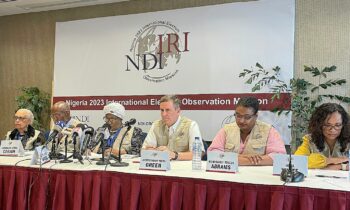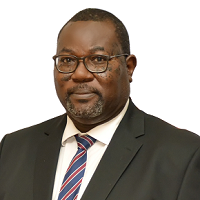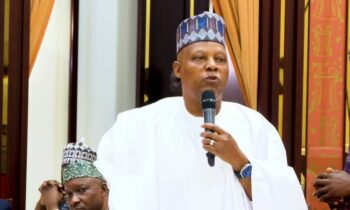… Logistical challenges and multiple incidents of political violence overshadowed the electoral process and impeded a substantial number of voters from participating

A coalition of foreign observers has blamed the independent Electoral Commission INEC for lack of transparency in the conduct of the 2023 presidential and national assembly elections in Nigeria.
The Joint Election Observation Mission (JEOM), involving the International Republican Institute (IRI) and the National Democratic Institute (NDI) and led by Joyce Banda, former President of Malawi, stated this in an official gazette released on Monday.
According to JEOM: “We congratulate the people of Nigeria for their resilience and enthusiasm to participate in the process,” said Ms Banda. “Despite large crowds in some polling stations and long waits, Nigerian voters demonstrated commitment to participate in the process and a strong desire to have their voices heard.”
The foreign election observation group said 40 of its members were deployed across all six geopolitical regions of Nigeria to observe the voting process, noting that despite the clamours for reforms to the Electoral Act 2022, “Nigerians were mostly not impressed by the conduct of the 2023 presidential and national assembly elections.”
“Logistical challenges and multiple incidents of political violence overshadowed the electoral process and impeded a substantial number of voters from participating,” the coalition said in its official statement. “Ongoing currency and fuel shortages also imposed excessive burdens on voters and election officials, and Nigerian marginalised groups, especially women, continue to face barriers to seeking and obtaining political office.”
Identified challenges
The election observers said they observed that the late opening of polling locations and logistical failures created tensions and the secrecy of the ballot was compromised in some polling units given overcrowding.
They noted that “at the close of the polls, challenges with the electronic transfer of results and their upload to a public portal in a timely manner, undermined citizen confidence at a crucial moment of the process”.
“Moreover, inadequate communication and lack of transparency by the Independent National Electoral Commission (INEC) about their cause and extent created confusion and eroded voters’ trust in the process,” the coalition stated. “The combined effect of these problems disenfranchised Nigerian voters in many areas, although the scope and scale are currently unknown.”
The foreign observation team, however, commended Nigerians, who they said, once again demonstrated their commitment to the democratic process, “despite these challenges, and displayed extraordinary resilience and resolve to have their voices heard through the ballot, and INEC administered a nationwide election according to the electoral calendar for the first time in the country’s recent history”.
US Election Observers, Amb. Mark Green
With respect to the ongoing presidential election, the Head of US Election Observers, Amb. Mark Green spoke extensively during a recent interview on some of the challenges facing Nigeria’s electoral process and what the INEC should do in order to be more transparent and erase suspicions. He also spoke about other issues emanating from the collation of results by the INEC.
Amb. Green said the first thing to understand is that democracy is a journey and that no democracy in the world is perfect, albeit, more representatives of democracy show up as we progress. He also said Nigerians were very resilient during the voting exercise as they came out in their large numbers despite the harsh weather and all the other obstacles to ensure that their votes count and their voices heard.
Speaking on INEC, he said the problem with INEC was a lack of transparency, thus creating room for suspicions. He said they should be more transparent by communicating well with the electorates, explaining when they have difficulties and so on. He also revealed that one of the challenges was that the process wasn’t tested before the actual election so the challenges weren’t observed on time.
He said “Most importantly, it’s transparency. People in this country (Nigeria) are hungry for democracy. I think INEC would be well served to be 100% transparent all the time. So on election day, if there’s a problem that pops up, simply hold a press conference or put out a statement saying ‘look, this the problem, this is why and this is how long it will take to fix the it’. I think when there’s silence, that creates a vacuum and then people get fearful. They start to get suspicious.”




